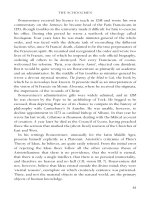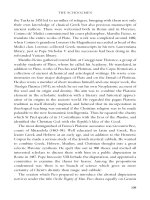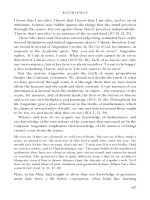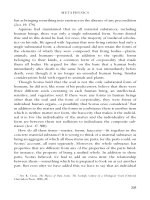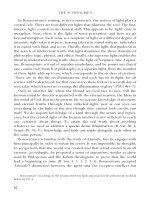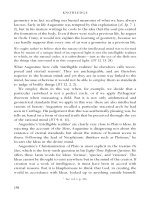Medieval philosophy a new history of western philosophy volume 2 ( PDFDrive ) 302
Bạn đang xem bản rút gọn của tài liệu. Xem và tải ngay bản đầy đủ của tài liệu tại đây (23.07 KB, 1 trang )
GOD
If grace was necessary for salvation, was it also suYcient? If you are
oVered grace, can you resist it? If so, then there would be some scope for
freedom in human destiny. While some would end up in hell because they
had never been oVered grace, hell would also contain those who had been
oVered grace and turned it down. In the course of controversy Augustine’s
position continually hardened, and in the end he denied even this vestige
of human choice: grace cannot be declined, cannot be overcome. There are
only two classes of people: those who have been given grace and those who
have not, the predestined and the reprobate. We can give no reason why
any individual falls in one class rather than another.
If we take two babies, equally in the bonds of original sin, and ask why one is taken
and the other left; if we take two sinful adults, and ask why one is called and the
other not; in each case the judgements of God are inscrutable. If we take two holy
men, and ask why the gift of perseverance to the end is given to one and not to the
other, the judgements of God are even more inscrutable. (DDP 66)
The crabbed crusader of predestination in the monastery at Hippo is very
diVerent from the youthful defender of human freedom in the gardens of
Cassiciacum. It was the former, and not the latter, whose inXuence was
powerful after his death and cast a shadow over centuries to come.
Boethius on Divine Foreknowledge
The problem that faced Augustine in reconciling human freedom with the
power of God can be solved if one is willing to jettison the doctrine of
predestination. But for all those who believe that God is omniscient there
remains a problem about divine foreknowledge: this concerns not God’s
willing humans to act virtuously and be saved, but simply God’s knowing what
humans will or will not do. This problem was discussed in a clear and
energetic fashion in the Wfth book of Boethius’ Consolation of Philosophy.
The book addresses the question: in a world governed by divine providence, can there be any such thing as luck or chance? Lady Philosophy says
that if by chance we mean an event produced by random motion without
any chain of causes, then there is no such thing as chance. The only kind of
chance is that deWned by Aristotle as the unexpected eVect of coinciding
causes (DCP 5. 1). In that case, Boethius asks, does the causal network leave
283

